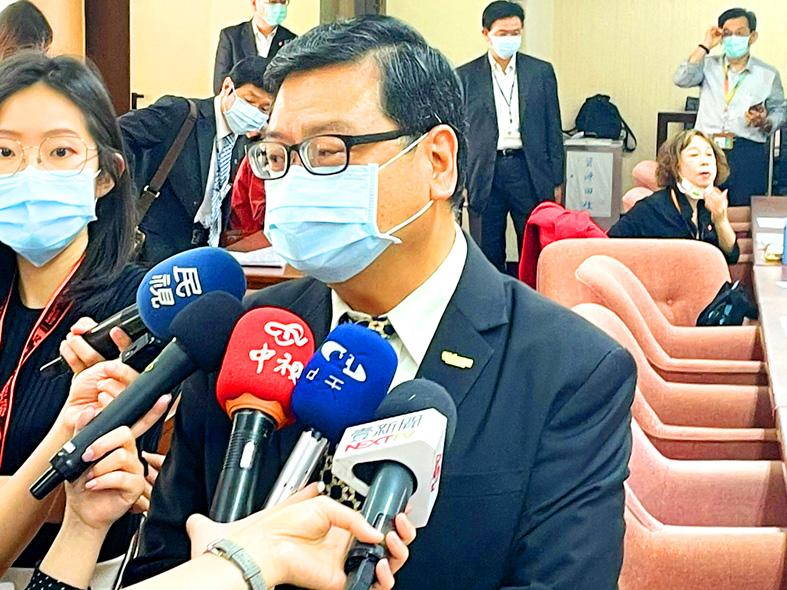More countries and territories are interested in forming “travel bubbles” with Taiwan, the Tourism Bureau said yesterday.
Earlier this year, then-minister of transportation and communications Lin Chia-lung (林佳龍) told a meeting of the legislature’s Transportation Committee that, in addition to Palau, the nation was negotiating “travel bubble” agreements with the governments of Japan, South Korea, Vietnam and Singapore.
Yesterday, bureau Director-General Chang Hsi-chung (張錫聰) told reporters on the sidelines of a committee meeting that more nations are seeking to ink “travel bubble” agreements with Taiwan.

Photo: Cheng Wei-chi, Taipei Times
Some of them have submitted proposals through diplomatic channels, while others have consulted the bureau, he said.
The bureau said that this week, its officials met with representatives of France, Guam, Hong Kong, Malaysia, the Northern Mariana Islands, Oman, the Philippines, Spain and Thailand, as well as the Africa Taiwan Economic Forum and Hachinohe in Japan’s Aomori Prefecture.
Guam, Hawaii, Malaysia, the Philippines, Singapore and Vietnam have been enthusiastic about establishing a travel corridor with Taiwan, Chang said.
“However, they know that the key is to prevent COVID-19 outbreaks, and a ‘travel bubble’ agreement has a greater chance of succeeding when both sides have assessed the risks and trust one another,” he added.
Asked about the low number of people interested in traveling to Palau, Chang said that the tours are still in the initial stage.
“We have long weekends at the end of this month and next month. More people are likely to book tours over the summer,” he said.
Foreigners with Alien Resident Certificates or Alien Permanent Resident Certificates can also book the Palau tours, the bureau said.
Regarding a “travel bubble” agreement with Singapore, Singapore Airlines general manager in Taiwan Chua Kian-hwa (蔡建華) told reporters that the airline is waiting for further instructions from the Singaporean and Taiwanese governments.
Tourists to Singapore are not required to quarantine if they test negative upon arrival, he said, adding that tourists receive the test results within a day.
Starting this month, the airline would resume three flights per week between Taipei and Singapore, he said.
“Together with the daily Scoot flights, there will be 10 flights per week between the two countries,” Chua added.

A magnitude 5.6 earthquake struck off the coast of Yilan County at 12:37pm today, with clear shaking felt across much of northern Taiwan. There were no immediate reports of damage. The epicenter of the quake was 16.9km east-southeast of Yilan County Hall offshore at a depth of 66.8km, Central Weather Administration (CWA) data showed. The maximum intensity registered at a 4 in Yilan County’s Nanao Township (南澳) on Taiwan’s seven-tier scale. Other parts of Yilan, as well as certain areas of Hualien County, Taipei, New Taipei City, Taoyuan, Hsinchu County, Taichung and Miaoli County, recorded intensities of 3. Residents of Yilan County and Taipei received

Taiwan has secured another breakthrough in fruit exports, with jujubes, dragon fruit and lychees approved for shipment to the EU, the Ministry of Agriculture said yesterday. The Animal and Plant Health Inspection Agency on Thursday received formal notification of the approval from the EU, the ministry said, adding that the decision was expected to expand Taiwanese fruit producers’ access to high-end European markets. Taiwan exported 126 tonnes of lychees last year, valued at US$1.48 million, with Japan accounting for 102 tonnes. Other export destinations included New Zealand, Hong Kong, the US and Australia, ministry data showed. Jujube exports totaled 103 tonnes, valued at

TRUST: The KMT said it respected the US’ timing and considerations, and hoped it would continue to honor its commitments to helping Taiwan bolster its defenses and deterrence US President Donald Trump is delaying a multibillion-dollar arms sale to Taiwan to ensure his visit to Beijing is successful, a New York Times report said. The weapons sales package has stalled in the US Department of State, the report said, citing US officials it did not identify. The White House has told agencies not to push forward ahead of Trump’s meeting with Chinese President Xi Jinping (習近平), it said. The two last month held a phone call to discuss trade and geopolitical flashpoints ahead of the summit. Xi raised the Taiwan issue and urged the US to handle arms sales to

BIG SPENDERS: Foreign investors bought the most Taiwan equities since 2005, signaling confidence that an AI boom would continue to benefit chipmakers Taiwan Semiconductor Manufacturing Co’s (TSMC, 台積電) market capitalization swelled to US$2 trillion for the first time following a 4.25 percent rally in its American depositary receipts (ADR) overnight, putting the world’s biggest contract chipmaker sixth on the list of the world’s biggest companies by market capitalization, just behind Amazon.com Inc. The site CompaniesMarketcap.com ranked TSMC ahead of Saudi Aramco and Meta Platforms Inc. The Taiwanese company’s ADRs on Tuesday surged to US$385.75 on the New York Stock Exchange, as strong demand for artificial intelligence (AI) applications led to chip supply constraints and boost revenue growth to record-breaking levels. Each TSMC ADR represents